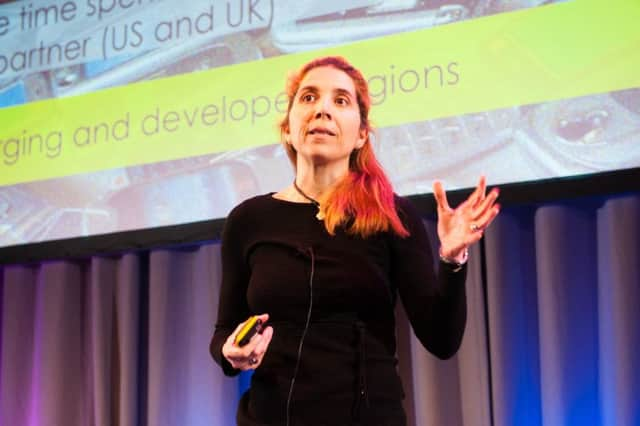How mobile phones could save lives in the developing world


Scotland’s growing data science sector has been challenged to utilise the universal popularity of mobile phones to make a positive social difference.
The ubiquity of mobiles means it is now possible for large-scale aggregated and anonymised human behavioural data of entire cities, countries and even continents to be collected and analysed.
Advertisement
Hide AdAdvertisement
Hide AdThis opportunity is of huge benefit to decision making bodies – from governments to aid organisations – to make informed decisions when reacting to social upheavals, such as natural disasters or disease outbreaks, thanks to existence of quantitative real-time information about populations.
That was the message from Nuria Oliver, head of research in data science at Vodafone, during her presentation at the inaugural Data Summit, which opened today at the Assembly Rooms in Edinburgh.
The two-day event forms part of DataFest17, billed as the first festival to promote data innovation in Scotland, which aims to help industry, public bodies and universities north of the border take advantage of the opportunities the ‘data revolution’ offers.
Speaking to 450 delegates from across the country, Oliver said even the most basic of mobile phones, such as those commonly used in the developing world, provided an immense opportunity to data scientists.
There are more than 6.8 billion mobile subscribers globally, or 96 per cent of the world’s population.
Oliver said the average adult in the UK and US now spends more time on their phone than watching TV or spending time with their partner.
“These phones are extremely competent computers that are connected and are passively collecting data,” she said. “What’s important is that this is a global phenomenon, including developing countries. Never before in our history has a piece of technology had such a wide adoption.
“In 2015, the MIT Technology Review declared data captured by mobile networks as one of the breakthrough technologies of the century.
Advertisement
Hide AdAdvertisement
Hide Ad“Mobile data allows us to understand mobility across a population – and that’s very important.”
Such technology could be used to track migration patterns in times of conflict, the spread of disease, or even the rise of poverty.
But the sector remains in its infancy. Questions remain as to who owns non-personal data, who has the right to access it, and whether it should be collectively shared by national governments. Telecommunications are heavily regulated and different states can take radically different approaches to privacy.
Oliver added it was a question of educating the public of the positive impact big data can make, particularly in the developing world, in solving complex social problems.
The challenge of data scientists, then, is to find a way of protecting an individual’s right to privacy while still allowing mobiles to share data that is statistically useful.
Data scientists already modify data to remove identifying characteristics, but this is more difficult when using information collected from individual phones.
However, positive examples already exist. Dr Phil Tetlow, host of the Data Summit, explained how mobile data had helped emergency services navigate Port-au-Prince in Haiti after the city was devastated by an earthquake in 2010.
“The city hadn’t been properly mapped in decades,” he said. “The problem was how rescuers could find their way around.”
This led to UN technicians studying satellite data and reports from workers on the ground to quickly generate maps. “Big data can save lives,” he added.